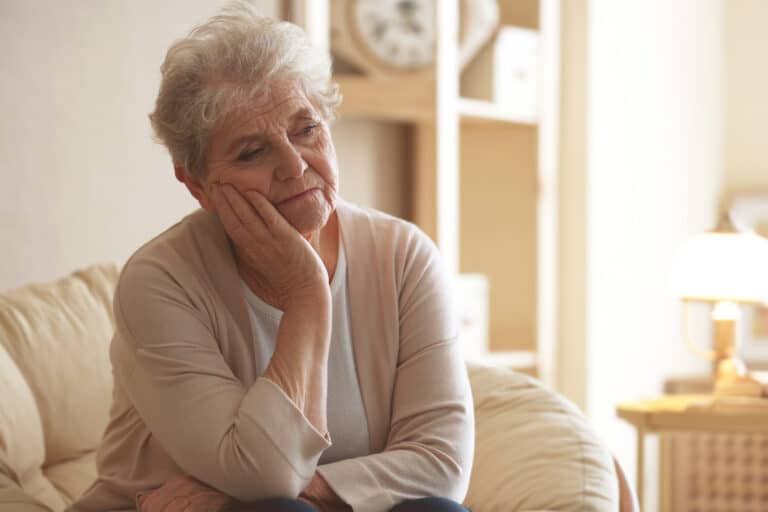When people think of depression, they often picture someone feeling sad and mopey. However, while sadness or hopelessness can be hallmarks of depression, oftentimes seniors with depression don’t necessarily seem – or even feel – ‘sad’ at all.
Five Common Surprising Signs of Depression in Seniors
Feelings of sadness, despair, hopelessness, helplessness, low self-worth, or feeling like a burden are common signs of depression that may be recognizable. However, other common signs of depression may be more surprising.
1. Complaints of physical pain
Complaints of physical pain or discomfort is frequently one of the top signs of depression. The pain can be from a known condition or just unexplained general achiness. Frequent headaches or worsening arthritis pain are common complaints.
2. No energy or motivation
Depression can sap a senior’s energy and motivation. Depressed seniors may lose interest in things they once enjoyed, such as socializing or favorite activities. They may move, speak and think more slowly than usual.
3. Sleep disturbances
Depression can change a senior’s sleep patterns. They may have difficulty falling asleep, or staying asleep throughout the night. On the other hand, they may tend to be overly sleepy throughout the day and night.
4. Memory problems
Forgetfulness is a common symptom of depression.
5. Not taking care of themselves
Seniors who are depressed often don’t take good care of themselves. They may skip meals, medications, bathing, brushing their hair or teeth, or changing into clean clothing. Weight loss can be a sign of depression.
Depression Can Be Treated
It’s important to talk with the doctor if warning signs of depression are noticed. Additional ways to reduce depression include:
1. Stay connected.
Staying involved and connected with others is extremely important.
2. Find meaning and purpose.
Find ways to ensure that the days are full of personally meaningful activities. Many find that helping others, getting out of the house, or taking care of a pet can help a lot with depression.
3. Get regular physical activity.
Regular physical activity is shown to reduce depression.
4. Eat healthy foods
Eat healthy food including proteins, complex carbohydrates and healthy fats. Avoid sugary foods and be sure to eat regularly, at least each 3-4 hours.
5. Sleep well.
Adopt healthy sleep habits by getting regular exercise early in the day, getting up and going to bed at the same time each day, avoiding alcohol and caffeine, and keeping the bedroom dark, cool and quiet.
6. Spend time in the sun
Sunlight is shown to reduce depression. Spend time in a sunny window, and get outdoors as much as possible.
7. Talk to the professionals
Besides the doctor, counselor, or therapist, home care services can also be helpful for seniors and family caregivers struggling with depression. Home care offers opportunities for rest and respite to family caregivers, which can make a big difference in how they can take care of their own needs.
Home care aides can help seniors with transportation to get to appointments, or just to get out of the house, out in the sunshine, or involved in other meaningful activities. They can support good nutrition by assisting with shopping or meal preparation. They can also help out with personal care, housework, and other tasks when these are just too much for the senior, or their family caregivers, to tackle.
If you or an aging loved-one are considering hiring Elderly Care in Sunny Vale, CA, contact the friendly staff at Home Care Professionals today.
Call (866)-940-4855
Sources
https://www.helpguide.org/articles/depression/depression-in-older-adults.htm
https://www.caregiver.org/caregiver-depression-silent-health-crisis
- Seven Indicators That Your Loved One Could Benefit from 24-Hour Home Care - April 18, 2025
- Creating Visual Cues to Support Independence for Seniors With Alzheimer’s - April 9, 2025
- Protecting Your Senior From Distracted Driving Mistakes - April 2, 2025




